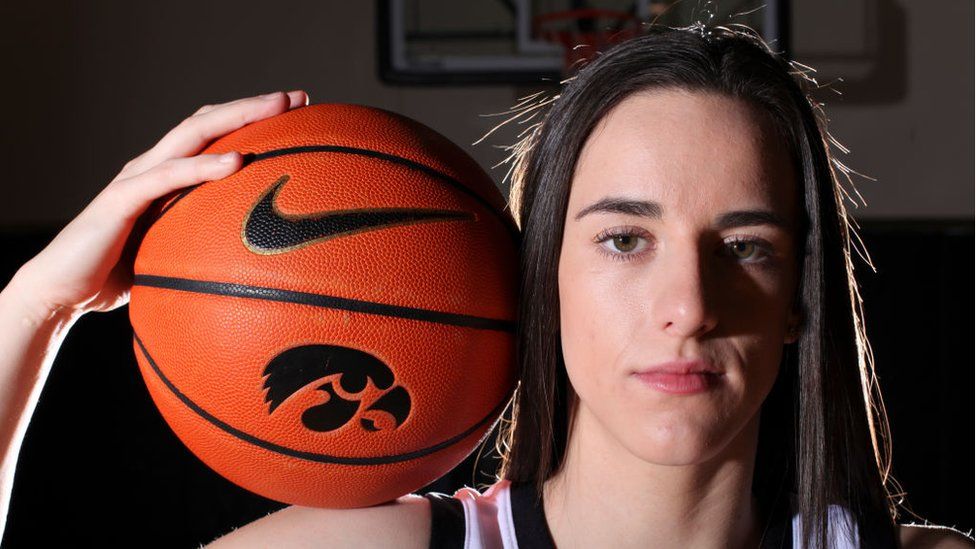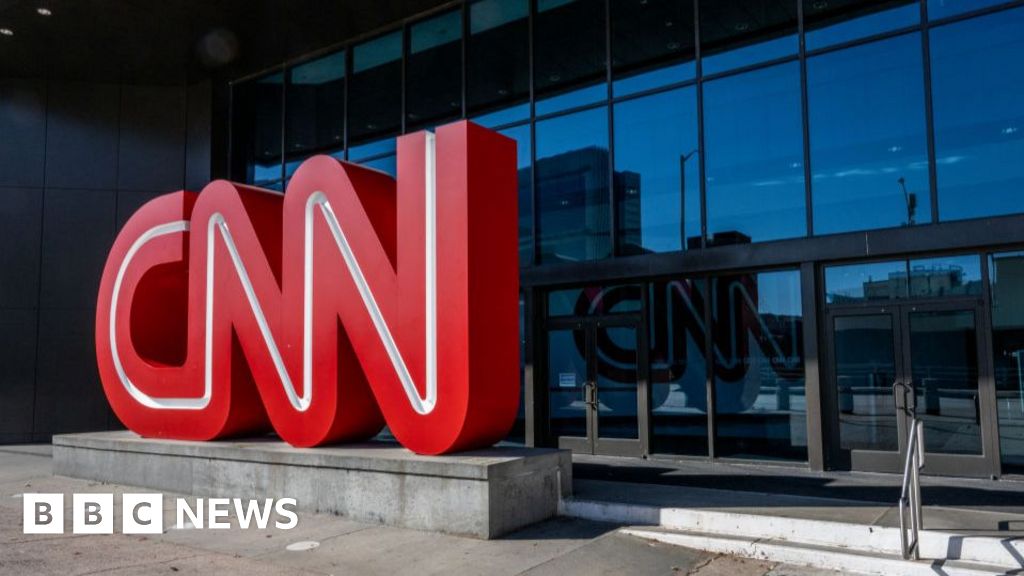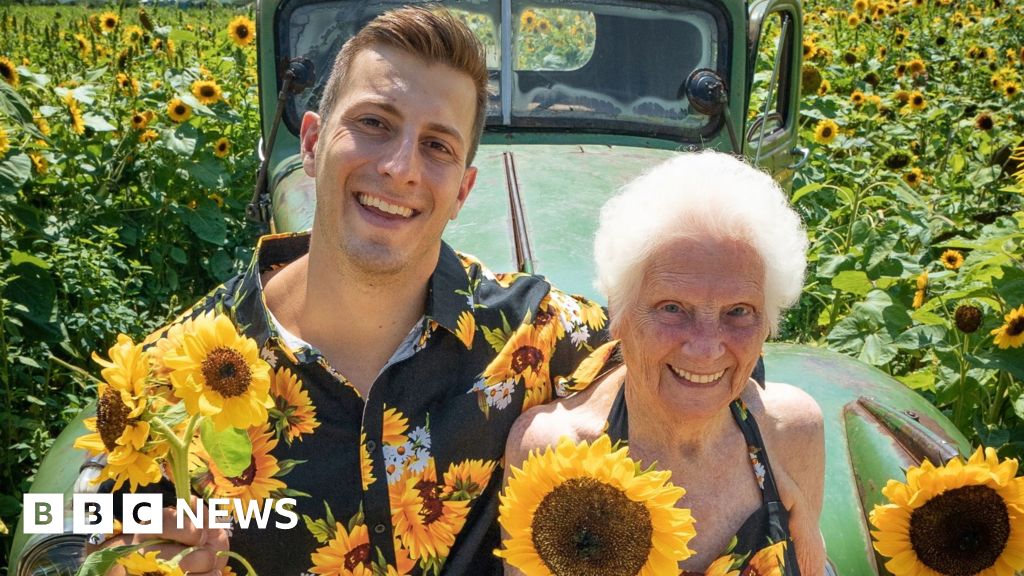ARTICLE AD BOX
 Image source, Getty Images
Image source, Getty Images
Caitlin Clark plays for Iowa
By Brandon Drenon
BBC News, Washington
The scene was described as "controlled chaos".
Dozens of people queued down the block and around the corner to get into the Sports Bra in Portland, Oregon, the first bar in the world - according to owner Jenny Nyugen - to only show women's sports.
The fact that it was the middle of a Monday did not curb the crowd's enthusiasm, nor did it slow them from consuming "three times" as many drinks as they normally would.
They were there to witness an epic women's college basketball tournament game between the Iowa Hawkeyes and LSU Tigers, headlined by superstars Caitlin Clark and Angel Reese.
From the Sports Bra crowd to celebrities Lebron James and Travis Scott, more than 12 million viewers tuned in. It was the most-watched college basketball game ever, women's or men's.
"It was electric," Ms Nguyen said, recalling the atmosphere as University of Iowa beat Louisiana State University, a victory led by Clark who scored a whopping 41 points.
"I've been watching women's basketball for decades. It feels like everyone else is just catching up... it's about damn time," she added.
The National Collegiate Athletic Association (NCAA) has been hosting the basketball tournament known as March Madness since 1939.
In just three weeks, 68 of the best college teams are winnowed down to one champion.
The annual event is a media frenzy where millions of fans watch games around the clock for days on end.
For decades, that only applied to the men's tournament. Not anymore.
Ticket prices for the women's championship this year cost twice as much as the men's on average, reaching as high as $11,000 (£8,736).
One of the reasons for this "watershed moment in women's basketball", said Amanda Christovich, a reporter at Front Office Sports, is generational talent like Iowa's Caitlin Clark.
The other, she said, is that the push for gender parity in college sports has reached a new height.
In 2024, the NCAA signed a TV contract with ESPN that values the women's tournament at $65m annually, more than 10 times the previous rate. Less than five years ago, it wasn't even possible to watch every game of the women's NCAA tournament on national broadcasts.
The bigger stage has given a bigger platform to bigger stars. And Clark - who is arguably the biggest name in the sport right now - has been a main driver of the recent buzz.
The college senior has scored over 3,900 points in her career, more than any other college athlete, male or female, in the history of the NCAA.
What is the Caitlin Clark Effect
Caitlin Clark is the 22-year-old headline-grabbing, trash-talking, fan-charming Iowa guard who is considered one of the greatest basketball players in college history.
She wins games. Lots of games. Breaks records. Lots of records. And fills stadiums with sell-out crowds eager to see her.
Many are hoping to witness her renowned long-distance shots, known as "three-pointers".
Standing dozens of feet from the basket, sometimes in the middle of the court, she shoots the ball over the heads of her opponents with ease. The distance often defies the average range of a collegiate female player.
Clark recently broke the record for the most three-point shots made in a single season, a record previously held by professional player Steph Curry.
Image source, USA TODAY Sports
Image caption,Caitlin Clark hits a three pointer.
Her star power - punctuated by more than one million followers on Instagram - has drawn a multitude of new fans to the sport. People travel thousands of miles and spend thousands of dollars just to see her.
The phenomenon of her influence has been dubbed the Caitlin Clark Effect.
As with Taylor Swift, her appearances not only drive ticket prices up, but also balloon hotel rates and strain restaurant reservation lists nearby.
"She's a once in a generation player. She's incredible. She's viral," Ms Christovich said. "She's the conduit by which a lot of people have discovered women's college basketball this year."
However, Ms Christovich added, "Would Caitlin Clark have garnered the attention she's getting now 20 years ago? Probably not".
"And that's not because she wouldn't have been as good. It's because people weren't paying attention," she said.
For decades, the women's tournament had been "treated like a second-class event", according to Ms Christovich.
One example was that the women's tournament was not allowed to use the NCAA's trademarked March Madness logo until the 2022 season. And, until recently, it was also harder to find on TV, Ms Christovich said.
Breaking down barriers
"The moment upon us is one that has been a snowball building for the last generation or so," said Kate Fagan, a former Colorado University basketball player, and author of the book Hoop Muses.
There were three major turning points, separated by decades.
First, in the 1970s the NCAA was forced to provide equitable athletic opportunities to women when the federal law known as Title IX went into effect. Then, in 1996, the creation of the Women's National Basketball League gave young players a path to becoming professional athletes.
Image source, USA TODAY Sports
Image caption,New fans are drawn to the sport.
The third major catalyst arrived more than 20 years later, on TikTok. In 2021, an Oregon University women's basketball athlete posted a video that compared a NCAA tournament training facility for women to one provided for men.
There were gross disparities. The men's facility featured rows of workout platforms, outfitted with dumbbells, barbells and weights capable of going into the hundreds of pounds. The women's facility had a single tower of dumbbells that topped out at 30 pounds (14 kg), and a few yoga mats. The video went viral.
A follow-up investigation by an outside law firm found that the NCAA "prioritizes men's basketball, contributing to gender inequity" and it was "significantly undervaluing women's basketball as an asset".
The NCAA then carried out a complete overhaul that included allowing the women's tournament to use the March Madness branding. The new media contract with ESPN, which now airs all of the women's March Madness games across multiple platforms, was another by-product.
"There were always great players. There were always great athletes," Pamela Grundy, co-author of Shattering the Glass, a novel chronicling women's basketball, said: "But now a greater group of people are seeing them.
"And frankly it's a lot better than people thought."
But, she noted, "sports is driven not just by tickets, but by sponsors".
Image source, USA TODAY Sports
Image caption,New fans are drawn to the sport.
Millions of dollars paid to college athletes
In 2021 a combination of state laws and NCAA rule changes opened up never-before-seen opportunities for college athletes to make money by selling the rights to their name, image and likeness (NIL).
Six-figure endorsement deals, inked by players - some of them still teenagers - soon followed. Top brands like State Farm and Nike began partnering with top athletes like Caitlin Clark.
"There are a handful of women athletes that are earning millions of dollars through NIL each year," said Blake Lawrence, founder and CEO of Opendorse.com, a platform for NIL contracts.
National endorsement deals also put athletes in front of more people more often, broadcasting them on TVs across America in commercials and games.
And women have an advantage with their social media presence, a "big component" in most NIL deals, Mr Lawrence said.
Still, female college basketball players remain held back in many ways by the NCAA structure, Ms Christovich said.
In the tournament, men's basketball teams are able to earn money for their conferences the further they advance through the rounds. The women's teams are not.
For the top four teams that remain in each of the men's and women's tournaments this year, that equates to a roughly $40m difference.
"What's incredibly impressive about the women's tournament success, is that it's happening despite the barriers," Ms Christovich said.

 9 months ago
55
9 months ago
55








 English (US) ·
English (US) ·